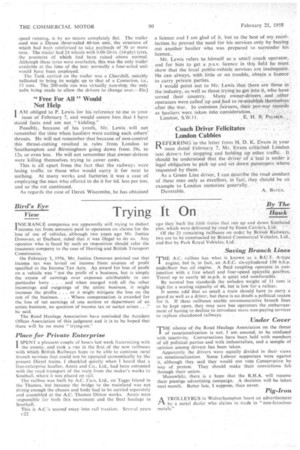Trying It On
Page 60

If you've noticed an error in this article please click here to report it so we can fix it.
I NSURANCE companies are apparently still trying to deduct
income tax from amounts paid to operators on claims for the loss of use of vehicles, although two years ago Mr. Justice Donovan, at Durham. ruled that it was illegal to do so. Any operator who is faced by such an imposition should refer the insurance company to the case of Herring and British Transport Commission.
On February 3, 1956, Mr. Justice Donovan pointed out that income tax was levied on income from sources of profit specified in the Income-Tax Acts. An atvard for loss of profit on a vehicle was " not the profit of a business, but is simply the excess of earnings over expenses attributable to one particular lorry . . . and when merged with all the other incomings and outgoings of the entire business, it might increase the profits . . . or it might mitigate the loss on the rest of the business. . . Where compensation is awarded for the loss of net earnings of one section or department of an entire business, no question of income tax or surtax arises .. ." he said.
The Road Haulage Association have reminded the Accident Offices Association of this judgment and it is to be hoped that there will be no more " trying-on."
Place for Private Enterprise
I SPENT a pleasant couple of hours last week fraternizing with
the enemy, and took a run in the first of the new railbuses with which British Railways hope to be able to continue rural branch services that could not be operated economically by the present Diesel trains. I chuckled quietly when I heard that a free-enterprise haulier, Annis and Co.. Ltd.. had been entrusted with the road transport of the train from the maker's works to Southall. where it was placed on rail, The railbus was built by A.C. Cars, Ltd., on Taggs Island in the Thames, but because the bridge to the mainland was not strong enough the chassis and body had to be carried separately and assembled at the A.C. Thames Ditton works. Annis were responsible for both this movement and the final haulage to Southall.
This is A.C.'s second essay into rail traction. Several years c.22 ago they built the little trains that run up and down Southend pier, which were delivered by road by Essex Carriers, Ltd. Of the 21 remaining railbuses on order by British`Railways, two are to be constructed by Bristol Commercial Vehicles, Ltd., and five•by Park Royal Vehicles, Ltd.
Saving Braneh Lines
THE A.G. railbus has what is known as a B.U.T. A-type engine, but is, in fact, an A.E.C. six-cylindered 150 b.h.p. underfloor bus oil engine. A fluid coupling operates • in conjunction' with a free wheel and four-speed epicyclie gearbox. Travel up to nearly 60 m.p.h. is quiet and comfortable.
By normal bus standards the unladen weight of 11 tons is high for a seating capacity of 46, but is low for a railcar.
It seems odd that so small a train should have to carry a guard as well as a driver, but there is no doubt a political reason for it. If these railbuses enable unremunerative branch lines to be kept open, they may save bus operators the embarrassment of having to decline to introduce more non-paying services to replace abandoned railways.
Under Cover
THE silence of the Road Haulage Association on the threat of renationalization is not, I am assured, to be confused with inactivity. Conversations have been held with members of all political parties and with industrialists, and a sample of opinion among drivers has been taken.
Apparently the drivers were equally divided in their views on renationalization. Some Labour supporters were against it, although they said they would not vote Conservative by way of protest. They should make their convictions felt through their union.
Meanwhile, there is a hope that the R.H.A. will resume their prestige advertising campaign. A decision will be taken next month. Better late, I suppose, than never.
Pig-Iron
ATROLLEYBUS in Wolverhampton bears an advertisement by a metal dealer who claims to trade in "non-ferocious metals."












































































































